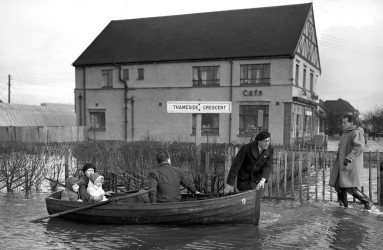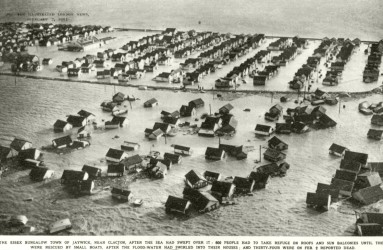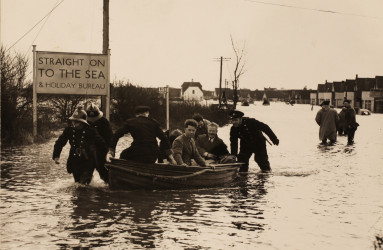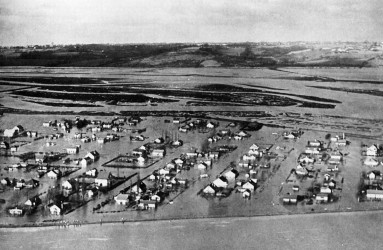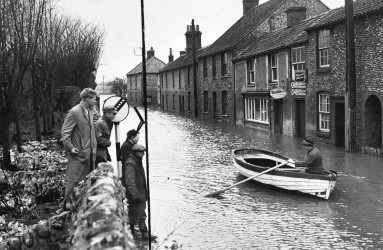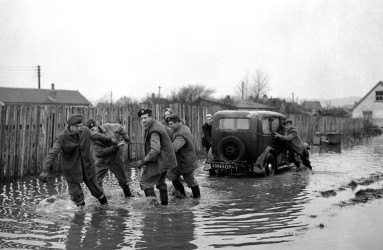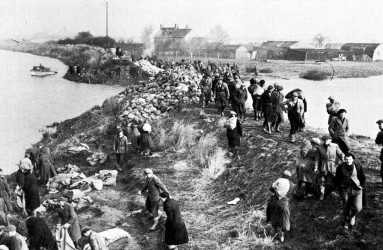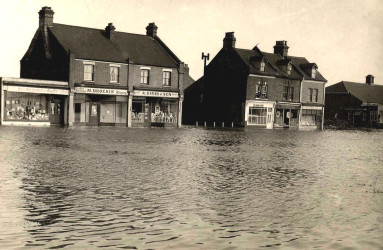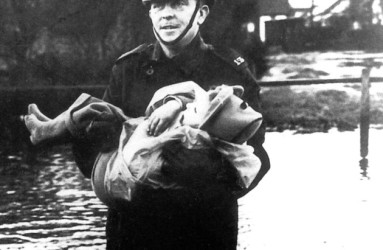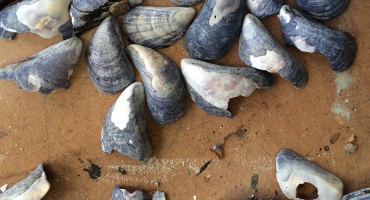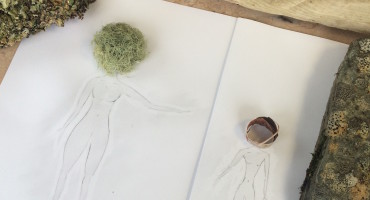After spending the past couple of days focused on the Netherlands, I decided to turn my attention to the effect that the Flood of 1953 had on Britain.
While the 1953 Flood was the worst peacetime disaster ever to strike Britain, and one of the greatest forgotten events of British history.
It has been speculated that the reason that this event does not feature prominently in British history comes down to its timing. It has been less than ten years since the end of World War II and the British were on a path towards improvement and progress. Much of the UK was still repairing the damages (physically and emotionally) from the war and the idea of a catastrophic weather event occurring during this time of healing seems to have been one narrative that was best forgotten. People decided to fill their memories of that year (1953) with the Coronation of Queen Elizabeth, the first ascent of Mt Everest and other stories which showed the prowess and progress of the British throughout the world. Another factor that has led to the forgotten nature of this catastrophe is attributed to the class divide. Many of the homes and lives that were washed away in this flood were the lower working classes. It was often the case that the cheaper homes and land was found in the floodplains, while the more expensive real-estate was elevated as flood defence. Many working class people along the coast were living in Pre-Fab houses, which were the cheapest and fastest way to build homes in post-war Britain. These lightweight homes were all that people could afford and they did not stand much chance against the 10-14 foot tidal surge that befell them. Class divide struggles often feature in British history, but like most shameful topics it is best avoided to become part of the national narrative. One more factor which may have led to the erasure of this event from history is the way in which the aftermath of the flood was handled. Most people did not have any home or life insurance, thus there was not a period of supported regeneration, but instead people had to merely carry-on with what semblance of life was left.
The night of 31 January to 1 February 1953, the death toll reached 530 human lives in the UK and over 47,000 farm animals perished.
The 1953 Essex Flood Disaster: The People’s Story by Patricia Reynolds Smith tells the events of that fateful night and subsequent days through the accounts of the survivors.
Below are some notes taken from this book:
- Families left their flooded homes, often with nothing more that the clothes they stood up in. False teeth, spectacles and babies’ bottles were left behind.
- …dead chickens, debris and swimming pigs…
- The clocks in Bathside had stopped at 12.20am
- Down the road, a boy was hanging out of a bedroom window with a piece of string and a bent pin on a stick, shouting to all and sundry that he wasn’t catching many fish.
- The pigs were swimming well until caught up in debris. Their shrieks I shall always hear. Suddenly, a convoy of coffins surrounded us, from the undertaker’s yard beside the railway line.
- Through a window into the Aynsley house, they saw that the table, which had been laid for breakfast, had floated almost up to the ceiling. When Mrs Aynsley returned to her otherwise ruined home, she found that the table had settled down again ‘with all the china and cutlery in perfect order
- They were taken to the Empire Cinema, Dovercourt – a temporary mortuary.
- Flood relief donations arrived from across the country and from abroad. Canada sent carpets, Ethiopia sent coffee, children from Kuwait sent toys, a school in Blackpool collected £10 for the children of Canvey, and pictured is one of the twenty houses Norway sent to Harwich.
- Morocco Café, which stood on a small area of higher ground on the corner of Beach Road and Garden Road, was commandeered by the police for the purpose. Radiators were put on, blankets borrowed and food and drinks organised for the survivors. Frantic and heartrending calls could be heard, from people trapped nearby, but safe in the café the ‘Morocco team’ were also trapped on their island.
- one woman who had a parcel tucked in her blouse, which fell out when they beached. It contained £2,000
- The water was full of hidden obstacles and live with electricity; petrol was leaking from the garage, and people were lighting matches to show their positions, apparently unaware of the danger.
- Then our bungalow floated off its base and started to move. By the afternoon there was still no sign of any rescuers and the house was still moving
- A week later, the family went back to the house and found the upturned table still afloat and on the table their dog, which they had assumed had drowned, still guarding the house.
- Many elderly persons coped well with the loss of their homes and almost all their possessions, but grieved over their lost spectacles and false teeth. One old man had even watched helplessly as his wooden leg floated out of the window. His leg was recovered later and dried out in an airing cupboard in Oulton Hall Hotel, where he was housed.
- But the elderly couple, unperturbed, refused to leave until the press photographer arrived to take a snap of them as they climbed out of the bedroom window.
- After toiling on the oars from dawn till dusk on Sunday, he gripped his large white mug of tea for warmth, and his work-hardened hands, rubbed raw, painted the mug red with blood.
- All the sea walls were under and we could see brilliant green electrical flashes as the houseboats in Mersea broke adrift and the power cables parted.
- Grandma slept through the night and refused to move out afterwards, saying, ‘Old Hitler never got me out, nor will the sea!’
- On the afternoon of Saturday, 31 January, Canvey’s new War Memorial Hall was opened with a dance and social gathering. MP Mr Bernard Braine spoke briefly of the war years and said of the new hall, ‘It will remind us that we are never so great as in adversity’.
- Later, he told how heartbreaking it had been to hear children screaming and to have been unable to help.
- Others slept on towards death.
- Peggy never forgot the smell.
- Later, there were no more boats and it became eerily silent except for the howling wind and the crash of doors and windows as the sea pounded them open.
- The ‘flood baby’ has become legendary. The most common version of the story tells of the baby found floating, alone, far away from the bungalow in a Moses basket, twelve hours after the first flooding. Eight-week-old baby Linda, orphaned but otherwise unharmed, was brought up by her maternal grandparents.
- a woman having pushed a pram from Canvey to the mainland with five small children. Her baby had to be thawed out by the kitchen stove. One man poled himself along in a dustbin until the bottom fell out. A pregnant woman was rescued by her husband by means of a tin bath, which he grabbed as it drifted by.
- Eight-year-old Chris Jennings was one of the few children who remained on Canvey throughout. Each day, abandoned animals were brought to the lounge of his home in the Jellico public house. Dogs, cats, rabbits, budgies and even a turkey were content to share the only available, and very crowded, temporary lodgings.
- I went back to Newlands another four times and rescued eleven people in total, but, unfortunately, four died of exposure. By this time I was completely exhausted and my hands were bleeding from rowing. After a hot drink I decided to go back to pick up the man on the roof but he had died of exposure. I felt guilty that I had not been able to persuade him to get into my dinghy. When dawn broke all the cries for help had stopped; there was just an eerie silence. I wanted to sleep, but found I couldn’t. All the emotions of that night then hit me.

